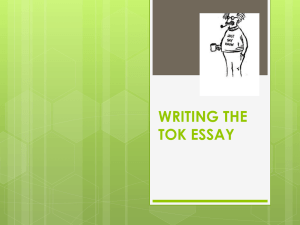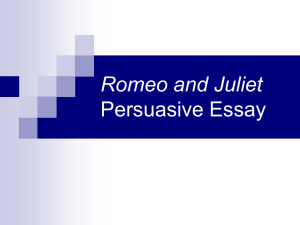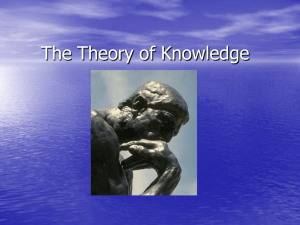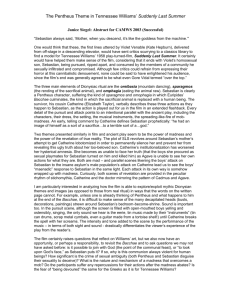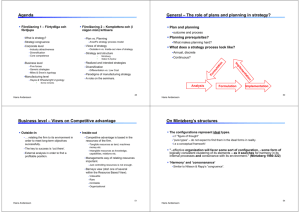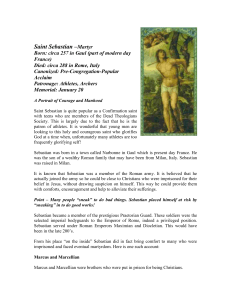Theory of Knowledge
advertisement
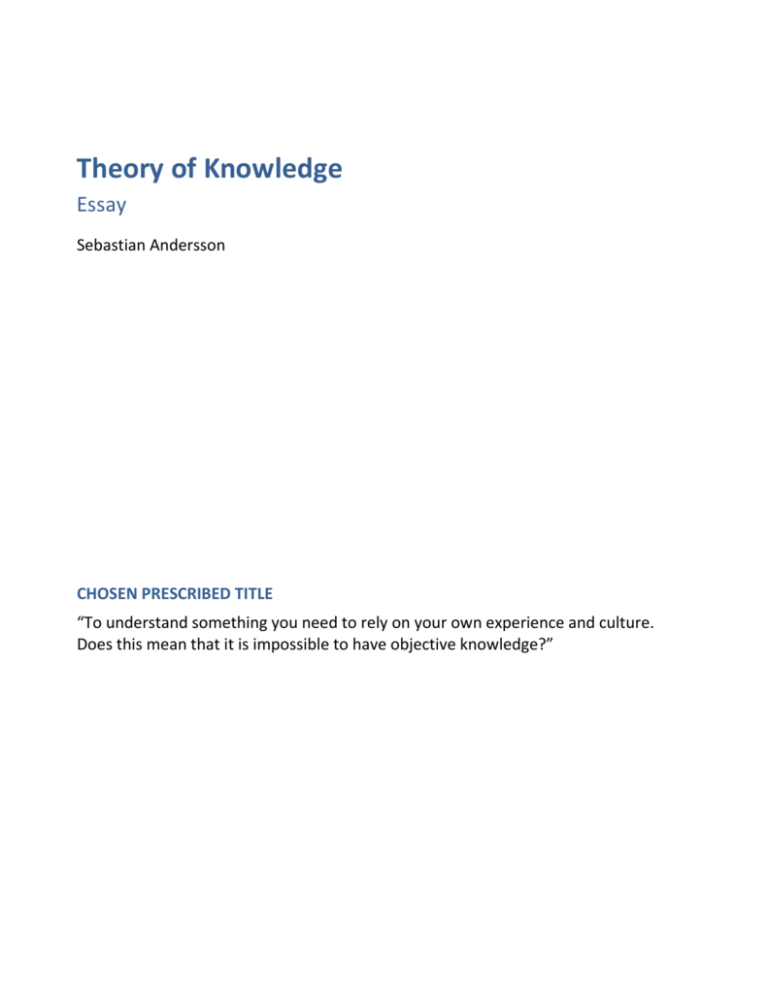
Theory of Knowledge Essay Sebastian Andersson CHOSEN PRESCRIBED TITLE “To understand something you need to rely on your own experience and culture. Does this mean that it is impossible to have objective knowledge?” ToK Essay Sebastian Andersson 2008-10-10 Knowledge is a very difficult concept to define. Since it depends on how deep we wish to go in to the concept, we can get quite substantial differences in interpretations and definitions of it. One quite tangible example of this is the issue of just having information about a subject, or having knowledge; the latter meaning a thorough and clear understanding of how things and concepts interlink and work together, whilst having information just means that one is able to memorize a whole bunch of facts but lacking the ability to put them together. I will in this essay look at this issue from the viewpoint of many different knowledge areas and how they relate to it. The chosen question points out a reliance on one’s own experience and culture as necessary in order to understand something. We are here faced with a statement presupposing something already in the title. It is taken for granted that we need to rely on our own experience and culture to understand things, but is this really the case? In a sense, one might argue that it is perfectly possible for me to get, say, a machine placed in front of me and work its features out independently from everything I have learned previously. However, in my eyes, this presents quite a big flaw in itself. I argue that, if we were to not rely on our own experience, we would stand like fools in front of everything. It follows plausibly that we as reasoning animals build our present knowledge and reasoning on what we have seen and experienced before, and according as build our sense of how things work in this world, thereby increasingly through our lives coming to a better understanding of things. The question implies that a concept called ‘objective knowledge’ exists. First of all, we need to ask ourselves if such a concept does exist, and if so, how we define it. We shall need to go into different areas of knowledge and see how the concept works in respective areas. Plausibly, ‘objective knowledge’ should best be explained as knowledge that would be the same regardless of the person who creates it as well as the one acquiring it, i.e. knowledge not containing any personal account. Hence, one may view this notion as more applicable in for example the sciences and in mathematics than in the arts and the social sciences. In that case, it seems that the level of ToK Essay Sebastian Andersson 2008-10-10 objectiveness increases the further from the culture-based and viewpoint-based disciplines we go, something that ultimately makes sense. No one would argue against the fact that mathematics as such is more objective than for instance philosophy or history. A tangible example of this is that 1+1 is considered to be 2 all over the world in the system we have worked out for ourselves here in this world. On the contrary, we often find ourselves troubled with different philosophical notions of say, how to live our lives. No one can present a ‘1+1-solution’ to such a question that everybody unquestionably would follow. Likewise, there is no historical fact over which there is no dispute in any way. The expression “the winner gets to write the history” is thus on substantial grounds whence we can say that history presents a much more subjective knowledge than the sciences and mathematics. Science seems to be placed in between these two ‘extremes’ in the sense that even though it presents itself as objective in the fundamental sense, we are nevertheless faced with a human element in the process of making and creating science. This implies flaws and fallacies, since we know that humans are not infallible. Hence, one can view science as in itself being objective, but processed by humans, thereby making it subjective, or at least less objective. Further, cultural relativity is of course the main factor to consider in this question. On a personal account, I can see that in every new situation I encounter, I always see or draw parallels to what I have previously seen or experienced. It makes no sense to suppose either myself or someone else to be completely blank in front of a new situation. Likewise, I think of it in a way that is influenced and coloured, to a greater or lesser extent, by my culture and my up bringing. Having said this, it seems strange to propose that there is something called ‘objective knowledge’. Further, another good example is economics. Being a student of the subject, I see that there of course are concepts and models that are indubitable in terms of being objective. It does not depend on where I come from; the law of demand states the same relation in every case. Coming back to the discussion regarding information and knowledge, there lies a big distinction here in relation to the discipline of economics. Whilst I may have perfect knowledge, objective one, ToK Essay Sebastian Andersson 2008-10-10 regarding for instance the law of demand, it is certainly more difficult, if not impossible, to gain objective knowledge regarding specific case studies. They are often so culturally dependent that it is difficult even for the most informed from the area concerned to gain the whole picture, whence it follows that I would use my own previous experiences to assess the situation, thereby gaining non-objective knowledge about the situation. So, in this case, I am using myself of an objective model but ‘only’ gaining semi-objective or subjective knowledge of the matter at last. However, note here again the distinction between information and knowledge, since it seems quite easy for one to gain objective information in this case, but not knowledge. On the other hand, going away from the issue of knowledge areas, there are some other fairly interesting aspects arising from this question. Consider a teacher at a school, who ultimately is supposed to teach his or her pupils objective knowledge. Note that I am here presupposing a democratic society; let’s call it Country X, where the country aims not to indoctrinate its citizens in any way. Despite the teacher’s utmost sacrifices to make the education as objective as possible, he or she will inevitably make the knowledge, or the information, depending on how one wants to view it, partly subjective. This happens, I argue, since he or she will use a common language, Language X, which of course contains certain cultural traces. He or she will probably also relate to things he or she has experienced as well as things that have occurred or occur in Country X, in order to make it easier for the pupils to grasp the concept or issue discussed and to put it in context. This way, the pupils will further probably for a long time relate what they have learned, referred to as “own experience and culture” in the question above. Hence, it will be very difficult to attain a thing such as objective knowledge. It is however not impossible to attain objective information, as we have noted. As to conclude, we can clearly see problems with this question, or rather the issue of attaining objective knowledge. It follows from my reasoning that it is somewhat easier to have objective knowledge of mathematics and to some degree science than of history and philosophy. Accordingly, it makes no sense for anyone to claim to have objective historical knowledge, whilst it seems somewhat more ToK Essay Sebastian Andersson 2008-10-10 plausible to claim to have objective historical information. After all, it seems feasible to see for example the fact that the Second World War did occur as indubitable, hence making it informational. The problems arise when we try to look at the reasons and causes in order to get a more knowledge-filled picture of the matter, which is when we encounter problems. Then we are faced with many different opinions and in some cases maybe contradicting facts. Hence, throughout the points presented, it seems strange to claim such a thing as completely objective knowledge to exist, a more plausible explanation is to look at the matter as in a scale with different degrees of objectiveness.



